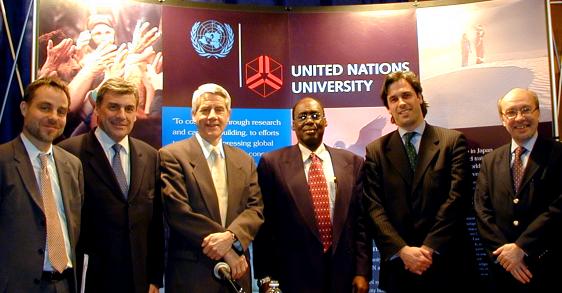
network of research and training centres/programmes
global security concerns
Is regional security the path to better global governance? That's the question underlying a new UNU Comparative Regional Integration Studies (UNU-CRIS) research project investigating how regional security affects global governance with particular emphasis on the relationship between the UN Security Council and regional agencies.
"With the world in turmoil over the issue of security right now, there is a need to explore new ways of handling conflict prevention and management," said project director Dr. Ken Graham, of the UNU Peace and Governance Programme. "This is directly linked to the issue of UN reform."
Graham noted UN Secretary-General Kofi Annan's recent comments on the need to find "unity of purpose based on a common security agenda with a global consensus on the major threats." Multilateral institutions, Annan said, may not be strong enough to cope with all of the challenges facing them and some may be in need of "radical reform."
According to UNU-CRIS, this reform could involve a more clearly-defined and effective role for regional agencies in conflict management. In the 1990s an over-burdened UN encouraged such roles, hosting a number of meetings with regional agencies and developing a framework for cooperation with a set of guiding principles. But the questions remains whether this has improved the operational relationship on the ground.
Success in reaching a global consensus on modern security issues, says UNU-CRIS Director Dr. Luk Van Langenhove, "depends on forging reconciliation in threat perception and response between the world's various regions."
"While the fundamental interests of humanity – survival, basic freedoms and sustainable development – are shared by all, cultural differences still exist in values and perceived interests," he said. "These differences are broadly correlated along regional geo-strategic lines. It might be that the UN approach to conflict management is best served by close collaboration with regional organisations."
The first report on the project, which is partly funded by the Institute for European Studies (IES-VUB), will be available in a month or so but in January a mid-term presentation was organised at the UN secretariat in New York. Preliminary research results were discussed by the panel of experts pictured below and an audience of about 150 representatives of UN agencies and missions.
 |
|
Pictured at the presentation in New York (from left): Jean-Marc Coicaud, acting head, UNU office at the United Nations; Jean de Ruyt, Belgian Ambassador to the UN; Kennedy Graham, senior research fellow, UNU Peace and Governance Programme; Omotayo Olaniyan, African Union permanent observer at the UN; Fernando Guimaraes, coordinating officer, Peacekeeping Best Practices Unit; and Luk van Langenhove, director of UNU-CRIS. |
![]()
Copyright © 2004 United Nations University. All rights reserved.